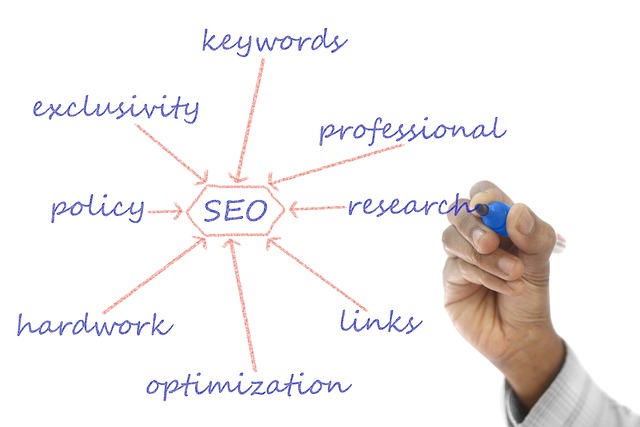SEO Services are vital for establishing and growing online presence, using multi-faceted approaches like keyword optimization, high-quality content creation, and backlink acquisition. On-page and off-page strategies, including keyword research, mobile optimization, technical site structure improvements, and building quality backlinks, drive organic traffic, enhance user experience, and boost website rankings. Local SEO helps businesses target specific geographic areas. Measuring success through KPIs like Google Analytics and SEMrush is crucial for optimizing digital performance. Future trends include AI/ML algorithms, voice search focus, faster loading times, and privacy-focused optimizations to stay competitive in the evolving digital landscape.
In today’s digital landscape, effective SEO Services are no longer an option but a necessity for online visibility. This comprehensive guide delves into the multifaceted world of SEO Website Optimization, providing insights into key strategies that drive success. From understanding the foundational elements to leveraging technical optimizations and keyword research, each step is crucial in enhancing your online presence. Discover how to create high-quality backlinks, master local SEO, and measure performance using essential analytics tools. By staying ahead of future trends, businesses can ensure their digital resilience and growth.
Understanding SEO Services: The Foundation of Online Visibility

SEO Services form the bedrock upon which online visibility is built. These services encompass a range of strategies designed to enhance a website’s ranking on search engine results pages (SERPs). By optimizing key elements such as keywords, content, backlinks, and technical infrastructure, SEO Services ensure that websites are not only seen but also easily accessible to their target audience.
Effective SEO Services start with thorough keyword research to identify terms relevant to the business or topic. This is followed by crafting compelling, keyword-rich content that provides value to users. Additionally, building a robust network of backlinks from authoritative sources enhances a website’s credibility and authority in its niche. These integrated approaches not only drive organic traffic but also foster a better user experience, ultimately contributing to long-term online success.
Key Components of Effective Website Optimization

The key components of effective website optimization involve a strategic blend of on-page and off-page SEO services. Firstly, conducting thorough keyword research is paramount; identifying relevant search terms that align with your target audience’s intent allows for tailored content creation. Optimizing meta titles, headings, and descriptions ensures your web pages resonate with search engine algorithms while engaging users with compelling copy. Internal linking structures facilitate seamless navigation, enhancing user experience and boosting page authority.
Additionally, external link-building strategies are vital to establishing domain authority. Acquiring backlinks from reputable sources signals to search engines that your website offers valuable content. Implementing mobile optimization is also crucial given the surge in mobile internet usage. A responsive design ensures your site renders seamlessly across devices, providing a seamless user experience and improving ranking potential.
On-Page SEO: Enhancing Content for Search Engines

On-Page SEO is a critical component of any comprehensive SEO strategy, focusing on optimizing individual web pages to rank higher in search engine results. This involves enhancing content to be more relevant and valuable for both users and search engines. Key elements include optimizing titles, headings, meta descriptions, and, most importantly, creating high-quality, keyword-rich content that satisfies user intent. Effective On-Page SEO ensures that your website provides a seamless browsing experience while aligning with the latest search engine algorithms.
Professional SEO services specialize in this area, offering expertise in keyword research to identify terms relevant to your business and target audience. They then strategically place these keywords throughout your pages, from the opening tags to body text, ensuring optimal visibility. Additionally, they optimize images, internal linking structures, and URL formats for better crawlability and indexation by search engines. By implementing these on-page optimizations, businesses can significantly improve their online presence and attract organic traffic through search engine results.
Optimizing Technical Aspects for Seamless User Experience

Optimizing the technical aspects of a website is a crucial step in enhancing its online visibility and providing an exceptional user experience. This involves ensuring the site is mobile-friendly, as most users access content on their smartphones and tablets. A responsive design adapts to different screen sizes, offering a seamless browsing experience regardless of the device used. Additionally, fast loading times are vital; Google prioritizes sites that deliver content quickly, improving user satisfaction and reducing bounce rates.
Technical SEO services include optimizing site structure, creating XML sitemaps, and implementing structured data markup. These practices help search engines understand the website’s content better, enabling them to crawl and index pages efficiently. A well-organized site with a logical hierarchy ensures users can navigate effortlessly, encouraging longer sessions and reducing exit rates. Moreover, regular security updates and robust data encryption safeguard user information and maintain trust, which is essential for building a loyal online community.
The Role of Keyword Research in SEO Strategies

Keyword research is a fundamental step in crafting effective SEO strategies. It involves understanding user intent and identifying relevant terms that potential customers use when searching for products, services, or information related to your business. By leveraging keyword research tools, businesses can uncover valuable insights into search trends, competitor keywords, and long-tail keywords that offer higher conversion rates. These insights enable SEO service providers to optimize website content, meta tags, headers, and even URL structures to align with what search engines consider relevant and authoritative.
In the competitive online landscape, successful SEO strategies hinge on staying ahead of algorithm updates and consistently providing value to users. Keyword research serves as a compass, guiding businesses towards relevant keywords that drive organic traffic and enhance their online visibility. With the right keywords, websites can attract their target audience, improve click-through rates, reduce bounce rates, and ultimately boost conversions, making keyword research an indispensable component of any comprehensive SEO services approach.
Building High-Quality Backlinks for Authority and Trust

Building high-quality backlinks is a cornerstone of effective SEO services, as it significantly boosts website authority and trust in the eyes of search engines. These links act as votes of confidence from other reputable websites, signaling to Google that your site offers valuable content deserving of a higher ranking. When acquiring backlinks, focus on securing them from authoritative sources within your industry or niche. This could involve reaching out to influencers, guest blogging on popular industry sites, or creating shareable, high-quality content that naturally attracts links.
A strategic backlink profile demonstrates trust and credibility, reinforcing the overall authority of your website. Search engines like Google use these signals to gauge a site’s relevance and quality, which directly impacts search rankings. Therefore, it’s crucial to invest in SEO services that prioritize building robust backlinks from diverse yet reputable sources to enhance your online visibility and drive organic traffic.
Local SEO: Reaching Target Audiences Geographically

Local SEO is a powerful strategy for businesses aiming to attract customers within specific geographic areas. It involves optimizing your website and online presence to rank higher in local search results, ensuring your business appears at the top when potential clients search for products or services nearby. By leveraging relevant keywords and location-based data, SEO services can help you reach your target audience precisely where they are most likely to engage.
This approach is particularly beneficial for small businesses and local service providers as it allows them to compete with larger corporations by showcasing their physical locations and availability to nearby customers. It’s about connecting with the right people at the right time, ensuring your business remains visible and accessible in a competitive market.
Measuring Success: Essential SEO Analytics Tools

Measuring success is a crucial aspect of any digital strategy, and SEO services are no exception. It involves tracking key performance indicators (KPIs) to understand what’s working and what needs improvement. The right tools can help you gain valuable insights into user behavior, search engine rankings, and overall website traffic.
One essential SEO analytics tool is Google Analytics, which provides data on visitors, their demographics, and how they interact with your site. Another powerful tool is Google Search Console, offering details about your website’s performance in the search results, including impressions, click-through rates, and keywords that drive organic traffic. Additionally, tools like Ahrefs or SEMrush can deliver in-depth competitor analysis, helping you stay ahead in the digital landscape by identifying trends and opportunities for optimization.
Future Trends Shaping SEO Website Optimization

The future of SEO website optimization is dynamic and ever-evolving, driven by technological advancements and shifts in user behavior. Artificial intelligence (AI) and machine learning are set to play a pivotal role, enabling more sophisticated search algorithms that can understand complex queries and deliver relevant results. This means that optimizing websites for search engines will require a deeper level of content personalization and context awareness. Voice search is another trend gaining momentum; as more users interact with assistants like Siri or Alexa, SEO services need to adapt by focusing on long-tail keywords and natural language processing.
Additionally, the rise of mobile internet usage necessitates responsive design and faster loading times, as mobile-first indexing becomes the norm. Privacy concerns are also shaping SEO strategies, with regulations like GDPR influencing how data is collected and used. To stay ahead, marketers must prioritize user experience, secure websites, and implement ethical SEO practices that align with these trends, ensuring their online presence remains competitive in a rapidly changing digital landscape.
